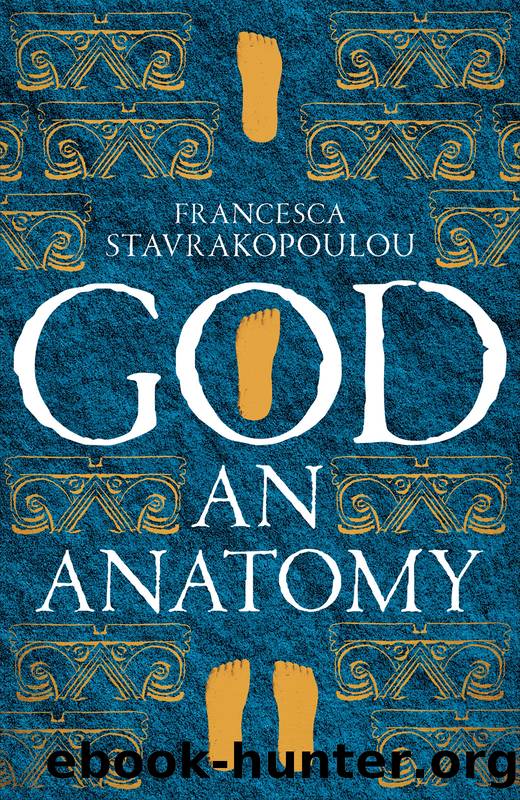God: An Anatomy by Francesca Stavrakopoulou

Author:Francesca Stavrakopoulou [Stavrakopoulou, Francesca]
Language: eng
Format: epub
ISBN: 9780525520450
Google: dxYlEAAAQBAJ
Amazon: 0525520457
Published: 2021-09-16T09:54:18.551869+00:00
Since the envoy
â his words being difficult â
was unable to render them,
the lord of Kullab
smoothed clay with the hand
and set down the words on it
in the manner of a tablet.
While up to then
there had been no one
setting down words on clay,
now, on that day,
under the sun,
thus it verily came to be;
the lord of Kullab
set down wo[rds on clay,]
thus it verily
came to be!35
In another Sumerian myth, Inannaâs temple city of Uruk is again the earthly home of writing. This time, writing is one of the divine qualities of civilization belonging to the clever god Enki, who has them stored in his underwater temple, known as the Abzu House, in the primordial city of Eridu. Inanna decides she wants to bestow these civilized attributes upon her beloved Uruk, and devises a way to talk Enki into gifting them to her. Sweet words give way to sweet wine â and a drinking competition. In an alcoholic stupor, Enki agrees to give Inanna writing, and she stows it away on her boat, along with carpentry, metalwork, weaponry, leather-work, prostitution, textile production, lovemaking, beer brewing, basket weaving and decision making. After a series of contests with sea storms and cosmic monsters â sent by a regretful, sober Enki â Inanna docks at Uruk, and the temple city learns to write.36
Underlying both these myths was the notion that writing was as much an extraordinary object as a type of civilized skill. The gods, of course, had always been in possession of objects such as these â and they frequently crafted their own. Like Yahweh, they wrote books of blessings and curses, indexed as the oracles and omens which might appear in the material world. According to a library catalogue at Nineveh, nine of the omen books within the archives were composed by the god Ea (Enki) himself, while others were said to have been dictated by Ea and written by scribes. Crafted before the great Flood, these were the divine books to which the most learned of scribes turned in seeking to discern the secrets of the heavens. But they were also the hardest to understand, as King Ashurbanipal himself declared: âI have learned the hidden secret of the complete scribal art. With my own eyes I have seen the tablets of heaven and earth . . . I have carefully examined inscriptions on stone from before the Deluge that are sealed, stopped up, [and] confused.â37
By their very nature, divine books were impenetrable to all but the most gifted â those mortals especially favoured by the gods themselves. Yahweh might have made his Torah accessible, but it still required the mediatory role of Moses to make its words plain in the earthly realm. His other writings, however, would remain in the hands of the heavenly executive, their mystic meanings revealed to mortals only on a need-to-know basis. Indeed, by the end of the Persian period, Yahwehâs writing process had become far more imperial in style, for he now engaged angelic courtiers to transcribe his words onto scrolls and tablets.
Download
This site does not store any files on its server. We only index and link to content provided by other sites. Please contact the content providers to delete copyright contents if any and email us, we'll remove relevant links or contents immediately.
Machine Learning at Scale with H2O by Gregory Keys | David Whiting(4292)
Never by Ken Follett(3935)
Fairy Tale by Stephen King(3368)
Reminders of Him: A Novel by Colleen Hoover(3078)
The Man Who Died Twice by Richard Osman(3070)
Will by Will Smith(2906)
Rationality by Steven Pinker(2349)
It Starts With Us (It Ends with Us #2) by Colleen Hoover(2338)
Can't Hurt Me: Master Your Mind and Defy the Odds - Clean Edition by David Goggins(2319)
Friends, Lovers, and the Big Terrible Thing by Matthew Perry(2218)
The Becoming by Nora Roberts(2188)
The Stranger in the Lifeboat by Mitch Albom(2112)
Love on the Brain by Ali Hazelwood(2059)
New Morning Mercies: A Daily Gospel Devotional by Paul David Tripp(1908)
A Short History of War by Jeremy Black(1842)
The Strength In Our Scars by Bianca Sparacino(1840)
HBR's 10 Must Reads 2022 by Harvard Business Review(1838)
A Game of Thrones (The Illustrated Edition) by George R. R. Martin(1711)
Never Finished: Unshackle Your Mind and Win the War Within by David Goggins(1701)
